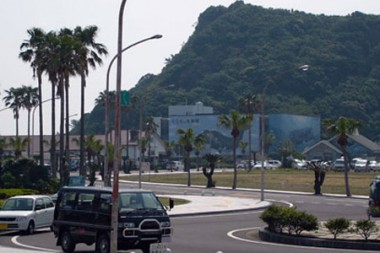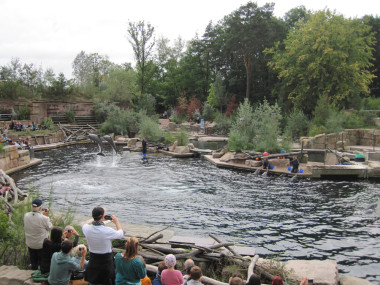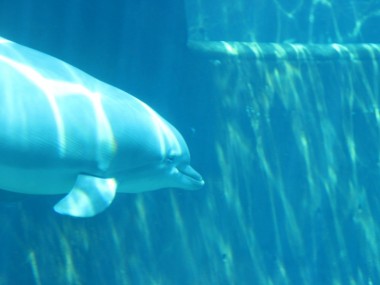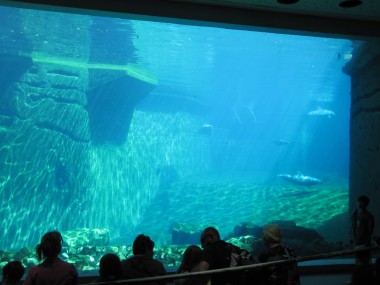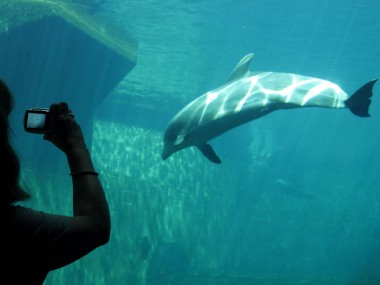MEERESAKROBATEN, 7. April 2014
Mehrere Tierschützer trafen sich am 28. März 2014 im Schweizer Ort Gland, um gegen die Delfin-Treibjagd in Taiji/Japan zu demonstrieren. „Was hat Gland mit Taiji zu tun?“, wird sich der eine oder andere fragen.
Der Grund, sich am Genfer See zu treffen, heißt WAZA (World Association of Zoos and Aquariums). Das ist der Dachverband aller Zoos und Aquarien; und dessen Zentrale liegt am Genfer See.
Mehr als 250 Zoos und Aquarien sind institutionelle Mitglieder der WAZA. Das heißt, sie handeln nach den Richtlinien bzw. dem ethischen Codex des Weltzooverbands.
Über 1.300 Zoos und Aquarien sind außerdem durch ihre Mitgliedschaft in einem regionalen oder nationalen Verband mit der WAZA verknüpft: z.B. EAZA (das ist der europäische Zooverband) oder JAZA (das ist der japanische Zooverband).
Treffen mit dem Direktor des Weltzooverbands
Neben Sigrid Lüber von OceanCare und dem ehemaligen Delfintrainer Ric O’Barry fand sich auch Sakae Hemmi von Elsa Nature Conservancy of Japan in Gland ein.
Zusammen mit etlichen Demonstranten forderten sie bei einem privaten Treffen den Direktor des Weltzooverbands – Dr. Gerald Dick – auf, dass die japanische Ländergruppe JAZA aus der WAZA ausgeschlossen werden solle. Schließlich wären in der JAZA einige Aquarien Mitglieder – darunter auch das Wal-Museum in Taiji – welche Delfine aus der Treibjagd halten bzw. verkaufen würden. Um ihrer Forderung Nachdruck zu verleihen, überreichte die Demonstrantengruppe eine Petition, die von 140.000 Menschen unterschrieben worden war.
WAZA verurteilt grausame Delfin-Treibjagd
Gerald Dick sieht das anders. Denn der Weltverband der Zoos und Aquarien unterstützt keinesfalls die Delfin-Treibjagd und arbeitet auch nicht mit dem Wal-Museum in Taiji zusammen. Im Gegenteil: Die WAZA verurteilt die brutale Jagd auf Delfine in Taiji.
Die sogenannte Dolphin Drive Hunt (Treibjagd auf Delfine) ist nicht mit dem Ethik-Codex des Verbandes zu vereinbaren – so steht es auch auf der Verbands-Website.
Der vom Weltzooverband aufgestellte Kodex verpflichtet außerdem alle Mitglieder des Verbandes, auf den Handel mit Delfinen zu verzichten, die im Rahmen einer Treibjagd gefangen worden sind.
U.a. arbeitet die WAZA auch mit der IUCN zusammen, um hohe Tierschutzstandards zu gewährleisten.
Die Weltnaturschutzunion IUCN (International Union for Conservation of Nature and Natural Resources) ist eine internationale Organisation, deren Aufgabe es ist, die Gesellschaften für den Natur- und Artenschutz zu sensibilisieren und so zu beeinflussen, dass eine nachhaltige und schonende Nutzung der Ressourcen sichergestellt ist. Bekannt ist sie durch die Herausgabe der Roten Liste gefährdeter Arten und die Kategorisierung von Schutzgebieten. (Quelle: wikipedia.de)
Ausschluss löst keine Probleme
Dr. Dick zeigte sich in der Gesprächsrunde mit den Tierschützern zwar sehr kooperativ, doch seiner Meinung nach würde ein Ausschluss der japanischen Gruppe JAZA aus dem Weltzooverband die Probleme nicht lösen. „Im Gegenteil. Damit wären jede mögliche Einflussnahme, Kontakt und Dialog unterbunden.“, so der Direktor von WAZA. Im Gespräch mit JAZA und den NGOs hofft er dagegen, zielorientierte Lösungen des Taiji-Problems zu erreichen.
Dr. Dick sagte den Demonstranten deshalb zu, noch vor Beginn der nächsten Treibjagd (also vor September) ein Treffen mit Nicht-Regierungs-Organisationen, der JAZA und dem Weltzooverband zu organisieren, um über die grausame Jagd zu debattieren und Lösungen für eine Beendigung herbeizuführen.
(Quelle: OceanCare)
Meine Meinung
Ich sehe es ähnlich wie Gerald Dick. Der Ausschluss der JAZA aus dem Weltzooverband würde an der Situation für die Delfine in Taiji nichts ändern. Da die meisten in der Treibjagd gefangenen Delfine sowieso im Land bleiben, würde der Ausschluss nichts nutzen. Ein Gespräch – wie von Dick angekündigt – bringt da schon wesentlich mehr, um zu einer zielorientierten Lösung zu kommen. Auch OceanCare begrüßt ja den Schritt des Weltzooverbands, sich mit einigen NGOs und der japanischen Zoo- und Aquarien-Gruppe an einen Tisch zu setzen.
Originaltext der WAZA zur Delfin-Treibjagd in Taiji
What is the “Taiji Dolphin Drive Hunt?”
In the Japanese coastal village of Taiji, wild dolphins are caught for human consumption. While doing so, fishermen are driving dolphins into nets and ultimately to a coastal bay. A small proportion of those dolphins are taken for aquariums.
Does WAZA condemn or support this practise?
No. WAZA does not support, and has never supported, the Taiji dolphin fishery in any way. WAZA has consistently condemned the practice of the drive hunt method. At its Annual meeting in 2004 the conference adopted a resolution on this issue. In 2014 WAZA published an additional statement to further clarify the role: The World Association of Zoos and Aquariums (WAZA) strongly condemns the Taiji dolphin drive hunt that is inhumane and leads to the death of many dolphins. While the Taiji drive fisheries do not involve any WAZA institutional members, the Association is deeply concerned about this practice and is taking all action possible to help stop it.
Why is WAZA accused of being involved or even responsible for this hunt?
Some organisations incorrectly assume that WAZA represents and is responsible for all zoos and aquariums in the world. This is not accurate. WAZA is a global network of animal welfare and conservation professionals that works to make positive changes that benefit wildlife. We do so by promoting cooperation and dialogue not only among zoos and aquariums, but companies and communities globally. Our international work is comparable to the international conservation work pursued in global treaties or conservation conventions. We do not accredit members but instead work to unite them for conservation efforts. We have no governing authority or jurisdiction over any member’s actions.
…
What is WAZA doing to stop the dolphin hunt?
WAZA and its members are deeply committed to the care and welfare of all wildlife globally. WAZA has engaged all bodies of the association, publically taken a clear standpoint on the issue and continues to advocate for intensified captive breeding programmes to phase out the take of dolphins from the wild.
Why can’t WAZA permanently end the dolphin hunt?
Like other NGOs, WAZA has no authority or jurisdiction over the drives. However, WAZA will continue to be an active and vocal partner in the global effort to end this unacceptable practice as WAZA and its members are deeply committed to the care and welfare of all wildlife globally.
Is the Taiji Whale Museum, performing those hunts, a member of WAZA?
Contrary to certain media reports, the Taiji Whale Museum is not and never has been a WAZA
member.
Is JAZA (The Japanese Association of Zoos and Aquariums) responsible for these hunts?
The full responsibility for whaling and the establishment of dolphin quotas is with the Japanese government and the responsible Fisheries Ministry. Every year the Japanese government establishes a quota for dolphin catches and the drive hunt. The majority of the dolphins are used for human consumption and a small proportion is taken for Japanese aquariums and some are exported. The operation is part of Japanese fisheries regulations. Members of JAZA are allowed to take live dolphins for their aquariums.
Is JAZA a member of WAZA?
JAZA’s membership with WAZA grants membership to the Association but it does not extend membership to each individual JAZA member institution.
Why does WAZA not expel JAZA from its organisation?
WAZA’s impact as an association comes from our ability to organize and activate our members to collectively advance animal welfare and conservation. WAZA is working globally through dialogue with all regions.
What is WAZAs latest statement on the drive hunt?
WAZA does not support, and has never supported, the Taiji dolphin fishery in any way. To the contrary, WAZA has attempted to intervene directly, and has endeavoured to use its influence to bring to an end a practice which surely has no place in modern times. WAZA’s efforts will continue, through direct engagement and influence, until the practice is halted. Secondly, WAZA does not represent ALL zoos and aquariums – it represents a group of progressive and passionate conservationists who are united in support of wild animals and wild places around the world. (Feb 2014)
(Quelle: WAZA)

